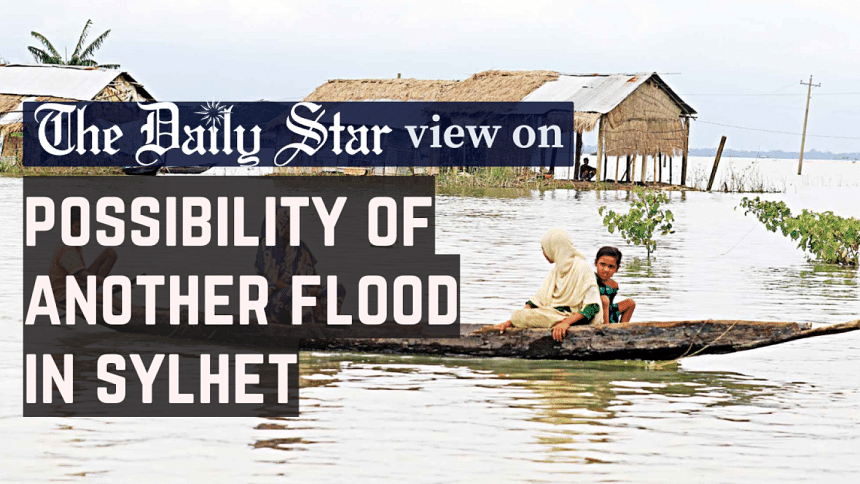Another spell of flooding can upend life in Sylhet

We're worried about the possibility of a second spell of flooding in northern and northeastern districts within less than a month of the first, which itself came on the heels of a flash flood in May. The possibility has been raised with floodwater in the haor region not receding as expected, and major rivers swelling again amid torrential rain and onrush of water from the upstream. A number of low-lying villages have been inundated again. This has dashed hopes of an early recovery. More worryingly, survivors now have to brace for another cold, lonely fight even while going through the painful aftermath of what has been the most devastating flood in recent years.
The frightening regularity and intensity with which we're being hit by floods should worry the policymakers. There are short-term challenges and long-term needs, both of which need to be handled with care. In the short term, they will have to deal with the shortage of food and relief. According to the local office of the United Nations, as much as Tk 545 crore will be needed to provide humanitarian support including relief and rehabilitation for flood victims. By contrast, the government's own response has been shockingly inadequate, having mobilised only Tk 4.67 crore and 3,720 tonnes of rice as of June 26, according to another estimate. This calls for a major shakeup of its policies.
Apart from access to food, drinking water and medicine, the fallout from floods has also been felt in the provision of utilities, in health, education as well as major income-generating sectors, with vast areas of arable land and fisheries damaged. Across the country, it has been felt in the kitchen markets. All this requires urgent attention, too.
The long-term priority, no less urgent, is to address continued flooding. Experts have identified three major reasons for it: 1) construction of unplanned infrastructure including roads, sluice gates, and dams; 2) loss of river navigability; and 3) filling-up of haor areas. Floods brought on by heavy rains and onrush of water from the upstream cannot subsist because of these barriers, which calls for a major rethinking of haor management. Without improving the water retention capacity of haors and the navigability of connecting rivers, we cannot prevent a recurrence of what one expert rightly termed "waterlogged flooding".
Although the government has sounded no alarm yet over the possibility of another flood, residents are already feeling the brunt of it. So far, the government's response to the flood indicated no sense of urgency, even after the massive suffering caused and the deaths of so many. This is really unfortunate. We urge the authorities to do everything necessary to reduce present and future suffering from the floods.


 For all latest news, follow The Daily Star's Google News channel.
For all latest news, follow The Daily Star's Google News channel. 








Comments